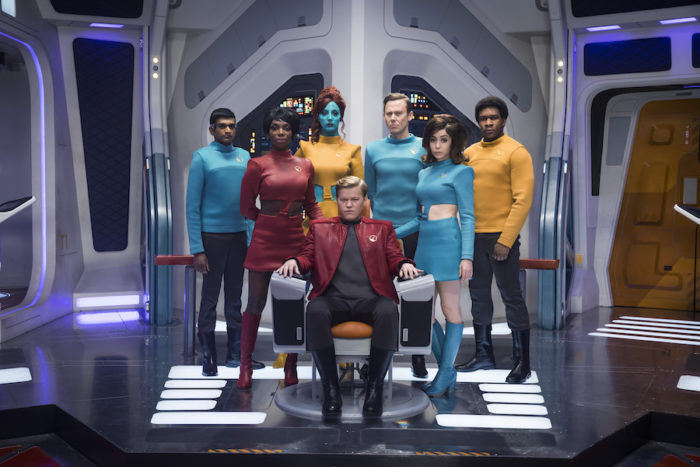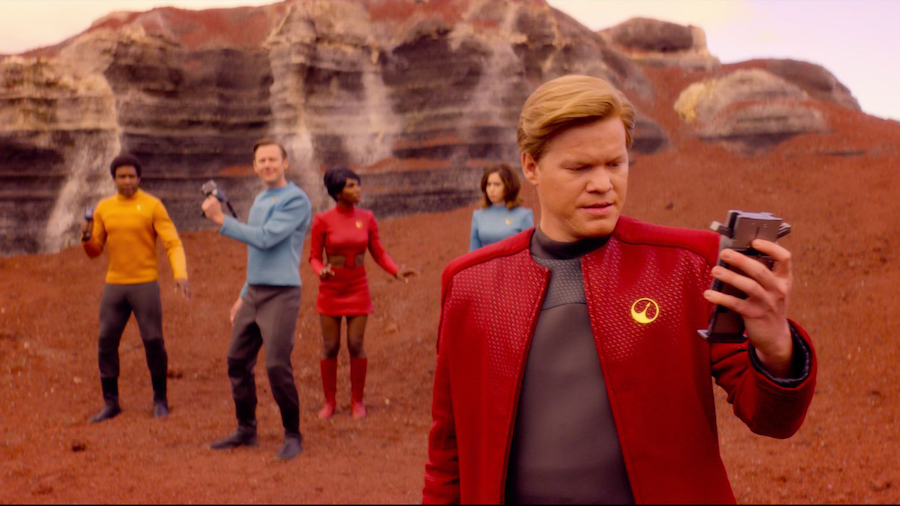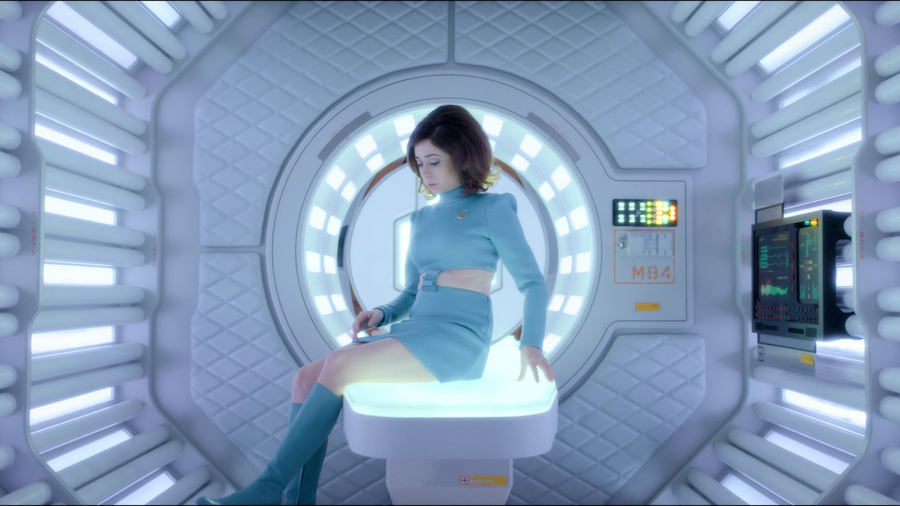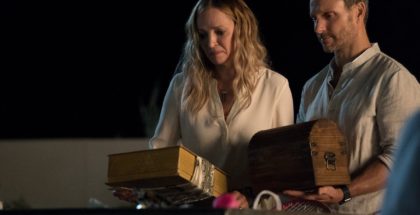Netflix UK TV review: Black Mirror Season 4, Episode 1 (USS Callister) – spoilers
Review Overview
Sci-fi pastiche
10Subversive shocks
10Social importance
10David Farnor | On 29, Dec 2017
Warning: This contains spoilers for USS Callister. Not seen Episode 1 of Black Mirror Season 4? Read our spoiler-free review of the whole season.
“Oh boy, it looks like there’s a new girl in the office.”
Black Mirror’s fourth season, now on Netflix UK, opens with a scathing attack on a society where locker room-style banter – and worse – is rife. Introducing us to the USS Callister, the episode lovingly pays tribute to the kind of cheese sci-fi series that generations grew up with, while populating it with workplace politics and a bullying authority figure. He’s Captain Daley (Jesse Plemons), and he leads his crew on daft missions that always end with them singing his praises and obeying his every whim. But Galaxy Quest (or The Orville) this ain’t: Black Mirror’s Star Trek spoof boldly steers its ship straight into the modern era of entitlement and abuse, setting its phasers firmly to ‘topical’. The show has always tapped into pertinent undercurrents and concerns, but after a year that has felt like a Black Mirror episode itself, choosing USS Callister as the season’s opener is perfect: this, as the Internet would say, is the Black Mirror episode we need right now.
The USS Callister, we soon learn, isn’t a real space ship at all: it’s a simulation as part of a video game designed by Daley. Co-founding a company with Walton (Jimmi Simpson), they’re successful tech entrepreneurs, with a virtual galaxy that takes its name from Space Fleet, an old programme Daley watched when younger. Enter Nanette (Fargo’s excellent Cristin Milioti), who has just started working there. In awe of Daley’s coding skills, she’s an excited employee, who tells Shania (a hilarious Michaela Coel) in the kitchen that it seems nicer than her last office, where the boss was a bully. Within minutes, she’s spotted by Walton, who swoops on her with a smile. (“Chuck a ham sandwich across the room and he’ll fuck it,” quips Shania, “but he’s basically an alright bloke.”)
And so the stage is set for a familiar narrative, in which the shy, reclusive developer finds romance and appreciation with the new girl – but Black Mirror rips up that scripted expectation and feeds the pitch-black shreds to its hyperdrive engine. Because unbeknownst to everyone, Daley is quietly collecting DNA samples of people in the office and producing digital replicas of them within his own modded version of the game.
“He’s got a gizmo,” explains Shania, who was beamed aboard after she called Daley out for staring. “I theorise an advanced biometric DNA virtual cloning device,” offers Dudani (Paul G. Raymond), who works in diagnostics and accidentally reset the admin permissions on a test module for 40 minutes. “Yes, he’s got a gizmo,” retorts Shania. There’s also receptionist Elena (Milanka Brooks), who was cloned because of “insufficient smiling”. And there’s Walton, whose taking-Daley-for-granted business plan led to his biological details being swabbed from the rim of smoothie cup.
“What year is it?” asks Nate Packer (Osy Ikhile), when Nanette finds herself on the bridge. “I’m still the intern?” he adds (he once brought Daley the wrong sandwich, and had his essentials retrieved from the toilet).
There’s a horror to the permanence of their prison, which taps into a fear that runs through several episodes of Black Mirror’s fourth season: the digital world, unlike the real one, is limitless, timeless and contextless, a limbo that can offer anonymity to trolls, detachment from civilisation to lone individuals, a long-term private space to those who need it. Once Daley’s workmates are sucked in, they’re in there forever, only able to die if he says, unable to go to the toilet, communicate with the outside world, or even have sex. It’s no coincidence that the game is called “Infinity”.
“The whole thing’s much better if you let yourself get into it,” insists Daley, with a grin. “This is my ship. I’m your captain,” he reiterates, torturing any rebellious crew members until they acquiesce. (Spare a thought for Gillian from marketing, who’s been turned into a tentacular spidery monster… thing.)
Jesse Plemons delivers an award-worthy performance as the cruel leader, emulating William Shatner with his swaggering posture. The whole thing is designed perfectly down to the tiniest detail, from the shiny, white surfaces and curved doors to the oiled, rigid haircuts and the brightly coloured costumes (naturally, not designed practically for any of the women) – you really can believe the prowess of Daley’s technical ability. Director Todd Haynes shoots it in a way that showcases the gorgeous production, but subverts the utopian idea it is meant to represent: Nanette wakes up in a dutch-tilting corridor that teeters into unsettlingly strange angles, while the crew at work are captured on handheld cameras that contrast with the static, staged location shoots on desert planets with beautiful galactic backdrops. (Listen out, too, for Daniel Pemberton’s witty score, which deliciously sends up the triumphant brassiness of Star Trek old and new.)
The undermining of sci-fi tropes continues all the through to the final frames. Just seeing the gang saying “I hope we’re going to die” as they fly into a black hole (which represents an automatic software update, thereby giving them a chance to reset their programmed prison and escape) is gleefully unlike the Star Trek norm. As Nanette comes to realise, this isn’t a perfect vision of the human race, but a “bubble universe ruled by an asshole god”. The notion of a “wholesome” portrait of the world, meanwhile, is satirically taken to the extreme by the way that Daley’s code has removed all genitalia from his characters – a regressive, retroactive blow by a man reaching back to a time when social attitudes were far more controlled by men. (“Stealing my pussy is a red fucking line,” declares Miloti’s fantastic hero, whose swearing ensures we’re firmly in the modern age.)
It’s a toxic cocktail of masculinity and technology, literally resulting in poison in the Callister’s on-board bar. “We have everything from Vengarian phlegm shots to distilled root blood from the Kangar quadrant,” says Walton, with a weary sigh. Jimmi Simpson is wonderful as the deceptively decent CEO, first introduced to us as a mildly sleazy employer, before revealing his sacrificial side and more decent morals – “You threw my son out of an airlock, so fuck you to death,” he cries, as he ends his own life to help the ship sail into the black hole before Daley can stop them. (Simpson and Plemons have wonderful anti-chemistry, as they repeatedly switch between opposite sides of the same proverbial coin.)
Walton’s rewarding arc is mapped out smartly over the feature-length runtime by William Bridges and Charlie Brooker’s script (this warped homage is clearly written from the point of view of fans who understand the appeal of that simpler, more sanitised depiction of life). Nothing, though, is as satisfying as seeing Nanette triumph over the sickening Daley: she’s the first female protagonist in a season full of female protagonists, something that sets a wonderful example and standard for the entertainment industry after a year of #metoo.
“We can go anywhere,” declares Dudani, as Infinity becomes the crew’s online playground rather than their prison. Haynes’ camera duly takes on a more sincerely cinematic sheen. Within seconds, of course, a bloke arrives to ruin it. “Yeah, Merry Christmas, so we gonna blow each other or you gonna trade?” blurts the irritating male voice. “Stick us in hyper-warp and let’s fuck off somewhere,” decides Nanette. “Uh-huh, you better run!” comes the reply. “King of space right here. King of space.”
As the disembodied voice is left alone with its pathetic pettiness, it’s a final, funny sting to round up a note-perfect episode – a sharp, witty takedown of power, abusive tyranny and the way that a portion of angry male geeks have poisoned fandoms of well-meaning franchises. In the weeks after some male fans have reacted with childish fear and protectionism to Jodie Whittaker in Doctor Who and The Last Jedi’s bold revision of their Star Wars predictions, Black Mirror is a cautionary tale of the dangers of not engaging with society, and of retreating into the dogma of one’s own isolated universe – and a rousing reminder that stories don’t belong to one person, but to everyone. Thematically rich, frequently entertaining and visually impressive, it’s a confident, hopeful, optimistic start to Black Mirror’s fourth season. Just don’t sign in to Twitter afterwards.
Black Mirror Season 4 is available on Netflix UK, as part of an £9.99 monthly subscription.























